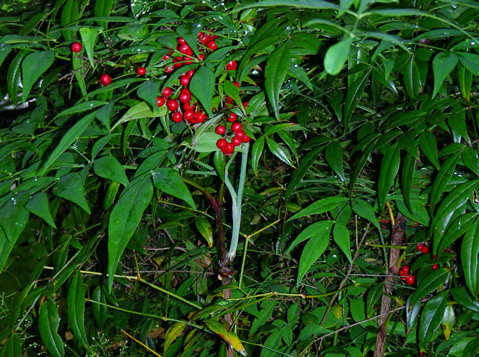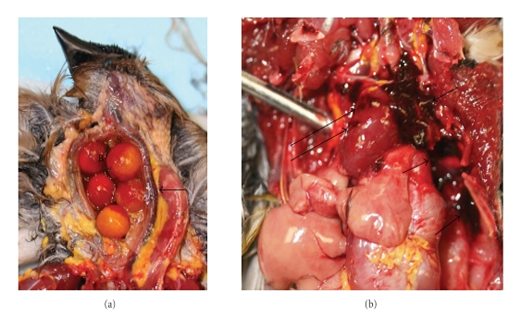
For Immediate Release Contact:Jerry W. Davis
August 12, 2013 (501) 262-5812
“NANDINA BERRIES KILL BIRDS”
HOT SPRINGS, ARKANSAS – You know this shrub as “Nandina”, “Sacred Bamboo” or “Heavenly Bamboo”. Nandina domestica is found in most landscaping mixes in yards, parks, hospital grounds, and other locations in the lower 48 states. Its bright red berries and contrasting dark green foliage is planted for color and texture by commercial landscapers. Some home owners plant Nandina to provide food for Cedar waxwing, American robin, Northern mockingbird, Eastern bluebird and other birds that depend on winter fruits to survive. Nandina berries last for months attracting hungry birds when food is in short supply.

Photo by Jerry W. Davis
When dozens of Cedar waxwings were found dead in Thomas County Georgia, Moges Wolderemeskel and Eloise L. Styer (2010), College of Veterinary Medicine, University of Georgia, found the cause to be Nandina berries, http://www.ncbi.nlm.nih.gov/pmc/articles/PMC3005831/. All birds had intact berries of N. domestica in their crops. There was hemorrhaging in the heart, lungs, trachea, abdominal cavity and other organs (Figure 1).
Nandina berries contain cyanide and other alkaloids that produce highly toxic hydrogen cyanide (HCN) which is extremely poisonous to all animals. Sudden death may be the only sign of cyanide poisoning and death usually comes in minutes to an hour Wolderemeskel and Styer report.

Figure 1 Toxicity of Nandina domestica in Cedar Waxwings. (a). Photograph showing berries of N. domestica in a crop of dead Cedar Waxwing. The arrows show congested and hemorrhagic trachea. (b). Photograph showing mediastinal and pulmonary hemorrhage.
The US Department of Agriculture and most states classify Nandina domestica as a noxious non-native invasive weed from China and Japan. It has naturalized and invaded our National Parks, Widlife Refuges, National Forests and other habitats throughout the United States. Home owners and commercial landscapers are still planting this toxic species without constraint. In addition to bird deaths in Georgia, bird deaths have been reported in Houston and other parts of the country. Hydrogen cyanide (HCN) is a painful, and unnecessary way for birds and other animals to die.
“Over 220 bird species nationwide are in serious decline, including our most common birds. Birds are being killed on all fronts” Davis said. “For people to ignore poisoning birds and other wildlife is inexcusable. By working together we can eliminate this toxic and noxious invasive plant. If you are not doing your part, the job is not getting done.”.
Jerry W. Davis, Certified Wildlife Biologist, 172 Heritage Drive, Hot Springs, AR 71901, jwdavis@cablelynx.com,